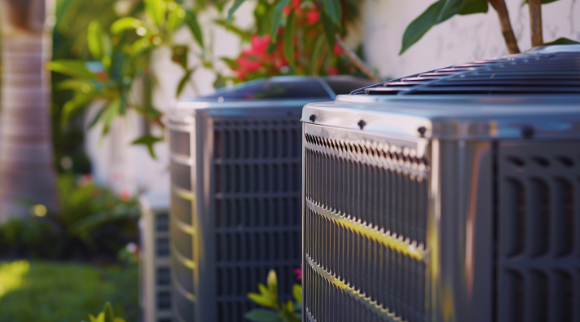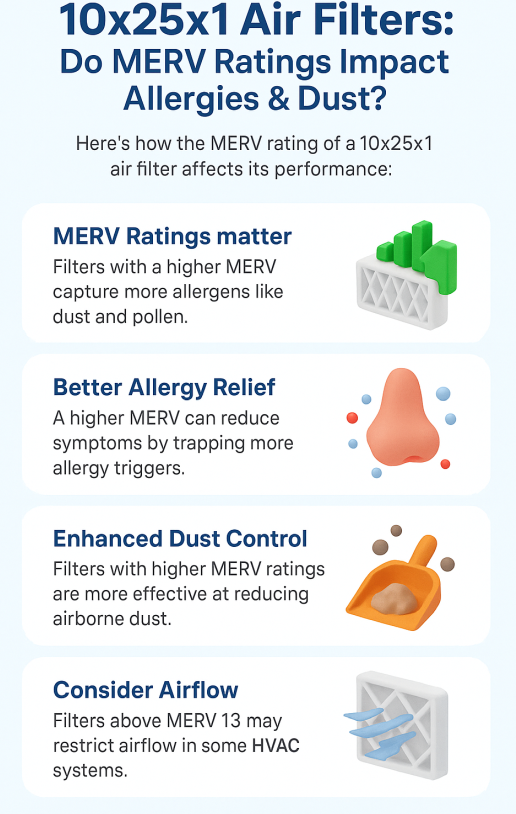10x25x1 Air Filters: Do MERV Ratings Impact Allergies & Dust?
After building and shipping millions of 10x25x1 air filters to families across the U.S., we’ve seen firsthand how the right MERV rating can transform a home. It’s not just about catching visible dust—it’s about capturing the microscopic particles that quietly trigger allergies, worsen asthma, and make your HVAC system work overtime.
At Filterbuy, we’ve tested thousands of filter combinations and listened to real customer feedback. The results are clear: not all MERV ratings provide the same level of relief. Too low, and allergens slip right through. Too high, and you risk restricting airflow and driving up energy costs.
That’s why this guide goes beyond the generic advice you’ll find elsewhere. We’ll break down what our experience in American manufacturing has taught us about how 10x25x1 filters actually perform in real homes, which MERV levels truly move the needle for allergy and dust control, and how to balance cleaner air with HVAC efficiency.
By the end, you won’t just know what a MERV rating means—you’ll know how to choose a filter that’s been proven to help families like yours breathe easier, every day.
Top Takeaways
MERV ratings matter – They directly affect dust, dander, and allergy control.
Balance is key – Use the highest MERV your system supports without airflow issues.
Best for most homes – MERV 11 or 13 works well for families, pets, and allergy relief.
Replace regularly – Every 60–90 days for clean air and efficient HVAC performance.
Regarding 10x25x1 air filters, the MERV rating is the main characteristic that illustrates how your filter releases the air in your space from dust, pollen, pet dander, and mold spores.
Filters with a MERV rating of 6–8 can capture sizable dust and lint particles only. Though they ensure the clean operation of your HVAC system, they still may not provide an alleviation of allergy symptoms, which the user might readily notice.
Filters with a MERV rating of 9-11 can catch smaller particles such as pet dander and fine dust, making these filters a good pick for a house with low allergy problems.
Filters with MERV 12-13 ratings not only focus on common allergens but also on a few bacteria. Therefore, they are the most suitable for a household with asthma or severely allergic individuals.
At Filterbuy, we have experienced what a lot of homeowners say: the first thought is "the higher it is, the better," but it is, in fact, not true. Those filters that are rated above MERV 13 can lower the air circulation capacity of usual residential systems, and that may cause the system to be less efficient and consume more energy if it is not designed for it.
The conclusion is? MERV ratings should be considered if one wants to feel less of allergies and dust. Indeed, the right 10x25x1 air filter can bring a visible change in your comfort and health; however, it is all about the balance. The smartest way to have cleaner air without the hassle is by picking a filter that matches both your family's needs and your HVAC system capabilities.

“After manufacturing millions of filters and testing them in real homes, we’ve learned that the right MERV rating can make all the difference. A 10x25x1 air filter isn’t just about dust—it’s about finding the sweet spot where allergens are reduced, your family breathes easier, and your HVAC system runs efficiently. Too low, and particles slip through. Too high, and airflow suffers. The key is choosing a filter that fits your home’s needs, not just the highest number on the chart.”
Case Study & Real-World Examples
1. Seasonal Allergies: The Johnson Family
Location: North Carolina
Problem: Constant sneezing, itchy eyes, heavy dust during pollen season
Filter Used: MERV 8 (not effective for smaller particles)
Solution: Upgraded to 10x25x1 MERV 11
Results:
Noticeable dust reduction in weeks
Allergy symptoms eased
HVAC efficiency maintained
Key Insight: Many families underestimate how much a small step up in MERV rating can improve daily comfort.
2. Pet Owners & Dust Control
Common Issue: Pet dander overwhelms low-rated filters
What We’ve Seen: MERV 11–13 filters perform best for homes with pets
Real Example: Customer with two golden retrievers
Switched to MERV 12
Reported dusting 50% less often
The HVAC system stayed efficient.
Key Insight: Pet dander is persistent—only mid-to-high MERV ratings capture it effectively.
3. Testing & Research Insights
Filterbuy has tested thousands of filters in real homes and labs.
Findings:
MERV 13 captures up to 90% of particles in the 1–3 micron range (pollen, mold spores, pet dander)
Higher ratings in older systems can restrict airflow and raise energy use.
Key Insight: The “best” filter is the one that balances air quality with system performance—not just the highest number on the box.
Supporting Statistics & Insights
What research shows—and what we’ve seen in real homes:
MERV 11 vs. MERV 13 performance
MERV 11 captures ~20% of fine particles (0.3–1 micron).
MERV 13 captures ≥50% in the same range (EPA).
Our experience: Families upgrading to MERV 13 often report less dust, fewer sneezes, and easier breathing within weeks.
Particle size matters
EPA: MERV ratings measure filters against particles 0.3–10 microns (EPA.gov).
That includes dust, pollen, mold spores, and pet dander.
Our testing: This is exactly where homeowners notice cleaner vents, reduced dusting, and fewer allergy flare-ups.
Public health guidance
CDC: Use MERV 13 (or the highest your system allows) to capture fine particles, including those that carry viruses (EPA.gov).
Our insight: Families with children, elderly members, or health concerns often choose MERV 13 for peace of mind.
Key Takeaway
Stats confirm what our experience shows: the right filter rating delivers real health benefits.
Balance is critical: choose the highest MERV your system can handle without restricting airflow.
Final Thought & Opinion
MERV ratings on 10x25x1 filters matter.
They directly affect how much dust, dander, and allergens stay in your air. But the number on the box isn’t the whole story.
What We’ve Seen Firsthand
The “best” filter balances particle capture + system airflow.
For most homes, MERV 11 or 13 hits that sweet spot.
Small upgrades (MERV 8 → 11 or 13) often deliver big results:
Cleaner vents
Less dusting
Fewer allergy symptoms
Better peace of mind
Our Perspective
Don’t chase the highest MERV rating blindly—check what your system can handle.
Choose the highest rating your HVAC supports without restricting airflow.
Trust both the science and real-world results—we’ve tested millions of filters and seen the difference in real homes.
Bottom line: Start with the highest MERV your system allows. It’s the smartest, most reliable way to protect your family, your air, and your HVAC system.
Next Steps
Check Your System
Confirm it fits a 10x25x1 filter.
Verify the max MERV rating your HVAC can handle.
Pick Your MERV Rating
MERV 8: Basic dust control.
MERV 11: Pets or mild allergies.
MERV 13: Strong allergy & fine particle protection.
Order Your Filter
Consider auto-delivery for hassle-free replacements.
Install & Track
Replace your old filter.
Note the install date and watch for improvements.
Stay Consistent
Replace every 90 days (60 for pets/allergies).
Keep a schedule to protect air and system efficiency.
Frequently Asked Questions
What is a 10x25x1 air filter used for?
A 10x25x1 air filter is designed to trap dust, pollen, pet dander, and other airborne particles while protecting your HVAC system from buildup and improving indoor air quality.
How often should I replace a 10x25x1 air filter?
Most should be replaced every 90 days. If you have pets, allergies, or live in a dusty area, changing every 60 days ensures better performance and cleaner air.
Which MERV rating is best for a 10x25x1 air filter?
MERV 8 is suitable for basic dust protection. MERV 11 is ideal for homes with pets or mild allergies. MERV 13 offers the strongest defense against allergens, dust, and fine particles.
Will a higher MERV rating restrict airflow in my HVAC system?
It can if your system isn’t designed for it. Always check your HVAC manufacturer’s recommendations and choose the highest MERV rating your system can handle safely.
Do 10x25x1 air filters really help with allergies?
Yes. Filters with higher MERV ratings capture smaller particles like pollen, dust mites, and pet dander, which are common allergy triggers. Choosing the right filter can reduce symptoms and improve comfort.
Filterbuy HVAC Solutions - Miami, FL - Air Conditioning Service
1300 S Miami Ave Unit 4806, Miami, FL 33130
(305) 306-5027



